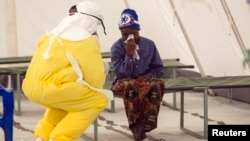U.S. officials are worried that progress in the global effort to curtail the spread of the deadly Ebola virus could lead to overconfidence and a reemergence of an outbreak that has already claimed more than 7,000 lives. Both health officials and lawmakers are warning the fight against Ebola may be entering its most critical phase.
On the outskirts of Freetown in Sierra Leone, children laugh and play, smiles on their faces, survivors of an epidemic that claimed the lives of their parents.
In neighboring Liberia, some markets are bustling again ahead of the Christmas holiday
U.S. Democratic Senator Chris Coons, speaking on a phone conference from Monrovia, says it is impossible not to take notice
“More than anything, I’ve been impressed with how social mobilization by Liberians at the very local level is what has made the essential changes that has changed the trajectory of this disease,” he said.
In Liberia, handwashing stations are everywhere. Person-to-person contact is limited.
These measures are working, Coons says, but he worries they will be difficult to keep up.
“It’s very uncomfortable to be at a church and not shake anyone’s hand, to not give anyone a hug," he said. "It is unusual to have your hands washed in chlorine every time you walk into a building and have your temperature checked every time you walk into a building.”
The U.S. Embassy in Monrovia says Washington has spent $770 million fighting the Ebola outbreak in Liberia, Sierra Leone and Guinea.
Nearly 3,000 U.S. military personnel have been sent to the region to build treatment centers and help with logistics.
The U.S. Centers for Disease Control and Prevention also has hundreds of people on the ground.
CDC Director Doctor Thomas Frieden, just back from a trip to the region, says while the progress is undeniable, there should be no sense of security.
“The fact that we’ve seen an exponential decrease in many areas doesn’t mean we’re going to get to zero [cases] without redoubling our efforts,” he said.
He says the reasons to worry are many.
“We know that if Ebola gets into a city you can see exponential growth…. We do think there are missed cases," Frieden said. "We know if there’s a case that arises and we didn’t know where it came from, there’s another case somewhere.”
Efforts to strengthen health systems across the region are underway. And the U.S. expects new detection methods to be available in the coming months - and possibly even an Ebola vaccine.
Still, Dr. Ron Waldman at the Milken Institute School of Public Health at George Washington University, warns the problems go beyond West Africa.
“This outbreak is now a year old, more than a year old, and a large part of the reason that it grew to one of this magnitude, which as we’re seeing, is extremely difficult to control, is that the international community did not respond aggressively enough, rapidly enough, efficiently enough, to the warning that it was given,” he said.
Officials and doctors are still sounding a warning: as long as there is still one case of Ebola out there, a new wave of infections cannot be ruled out.




